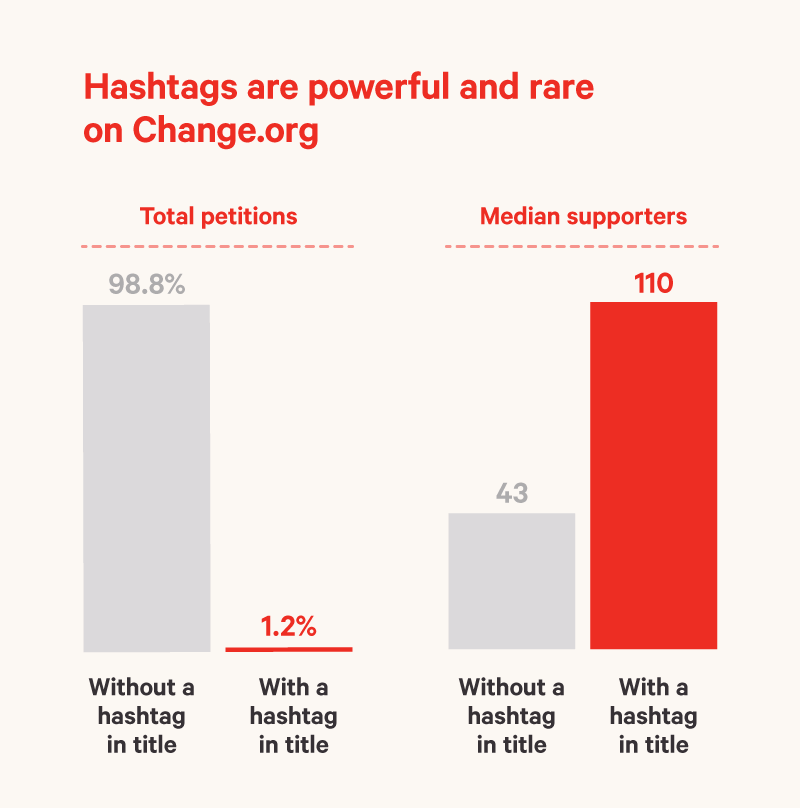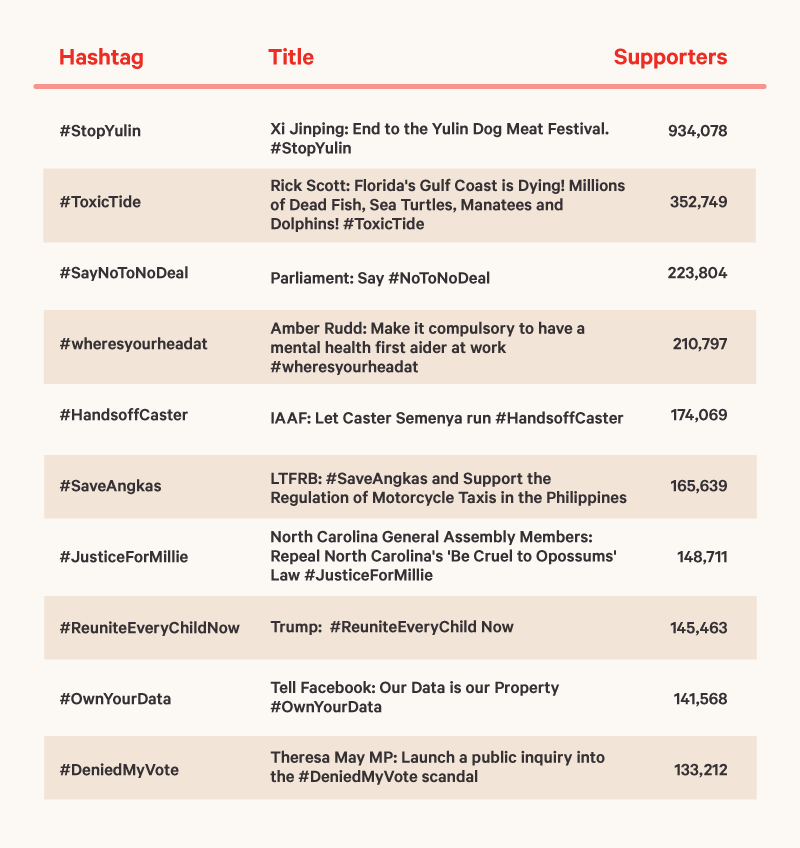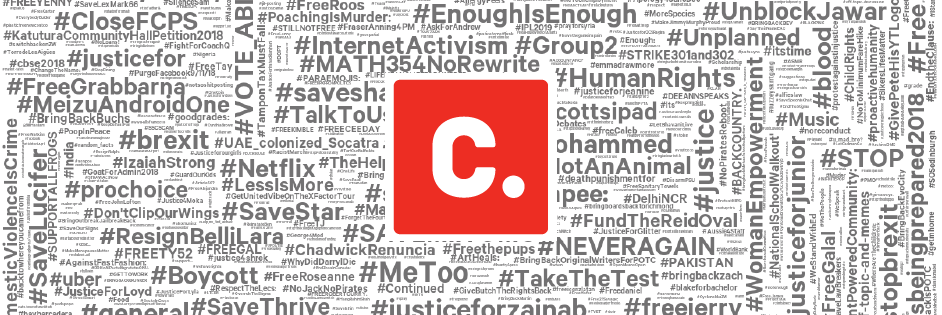It was only in 2007 that the hashtag fundamentally changed how we communicate with one another online. First proposedby Chris Messina on Twitter as a way to create like-minded groups and facilitate conversations, it has reshaped the internet and serves as a primary communication tool on Twitter, Instagram, Facebook, and dozens of other social media sites.
Hashtags have always been about organizing and finding like-minded people—the groups who are talking about what you’re talking about. Naturally, the tool was adopted by activist communities, where it has propelled conversations from #Ferguson to #LoveWins to #BlackLivesMatter around the world.
Because it’s so tied to social movements, it seems natural that the hashtag would appear in Change.org petition titles as well. Because hashtags haven’t historically been a search feature of the site, however, their use has essentially been symbolic—a way to amplify a message and create an identity.
It was a big surprise, then, when we analyzed the use of hashtags in petition titles and found they correlated with higher petition performance. Although hashtags only appear in about 1% of petition titles, those petitions do exceptionally well, earning nearly 3x the median supporters of petitions in general.

Of course, simply adding a hashtag to a petition title doesn’t automatically earn supporters—it’s just one piece of a much larger puzzle. Still, the outsize performance of these hashtag-containing titles inspired us to take a closer look. People who start a petition on Change.org tend to be passionate individuals with a knack for making their voices heard, and we wanted to find out how hashtags were helping them do it.
Why Do Hashtags Perform Well in Titles?
Most petitions that use hashtags effectively in their titles tend to be part of larger movements. These hashtags provide a common identity with a movement when it is being broadcast across other social platforms and give petitions a kind of brand unity that’s instantly recognizable to supporters. They also serve the secondary purpose of giving new supporters a ready-made hashtag for their own promotion of the petition or the cause.
This was certainly the case when we examined the most-signed petitions that use hashtags in their titles.

#StopYulin has been a recognizable call to action on Twitter for years, aimed at ending thehugely controversial Lychee and Dog Meat Festival in Yulin, Guangxi, China. Petitions to stop the festival have been among the most widely supported in Change.org history, with multiple campaigns earning well over 2 million signatures. Although the festival continued in 2019, activists have remained undeterred, and dozens of U.S.-based animal shelters rescued dogs ahead of the event this year.
In the U.K., #SayNoToNoDeal became a popular hashtag for the roughly 50% of Britons who believed a “No Deal” Brexit would lead to a bad outcome for the nation. A petition to Parliament, using only this hashtag as its title, became one of the most successful Brexit-related petitions on Change.org.
In hundreds of other examples, hashtags being used to promote a cause elsewhere on social media were included in petition titles, with dozens of petitions using constructions such as #JusticeFor_____ and #Save_____, reflecting other Change.org data that positive, action-oriented language tended to perform very well with civic activism communities.
Hashtags Help Signal and Start Movements
As we’ve alluded to above, the hashtags used on Change.org during this period of research didn’t serve the same purpose they do on Twitter, Instagram, or other social platforms—petition starters simply used them to provide unity with broader missions and movements of which a Change.org petition was simply a part. Since most petitions receive substantial visitor traffic from social sites, the use of hashtags in titles provides continuity and a sense of community around a cause.
The biggest takeaway from this analysis is that the presence of a hashtag indicated that petition starters had created or joined forces with a larger activist community, and this hashtag was used to promote the spread of their petitions across other social channels. If you’re writing a petition that’s part of a movement already using a signature hashtag, you should consider including it in titles simply because it’s easy to identify and probably already has traction elsewhere. Petition starters who intend to promote their campaigns on social media may want to include a custom hashtag in their petition title that they can later use on other platforms.
It’s likely that some of the success seen for hashtag titles is driven more by the fact that support communities around these causes already existed, but a Change.org petition served as a singular vehicle for supporters to amplify their message. Nonetheless, the differences we found were substantial and should merit consideration for any new petition starter on Change.org.
We hope this work helps guide you as you begin thinking about crafting a petition around your own cause, and you can start crafting your message for change here.
Nick Allardice is the Chief Product Officer at Change.org. Twitter, LinkedIn.

